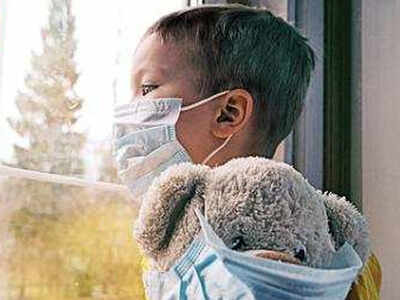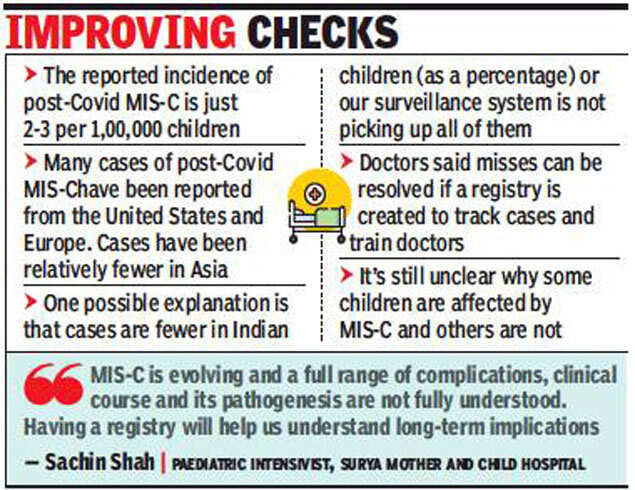Health ministry steps up surveillance of MIS-C in kids

Picture used for representational purpose only
PUNE: After post-Covid mucormycosis in adults, the Centre has now stepped up efforts to estimate the burden of post-Covid multisystem inflammatory syndrome in children (MIS-C) across the country.
The director-general of health services (DGHS), in a letter on June 2, asked all states and UTs to submit weekly data on new cases of MIS-C.

Unlike mucormycosis, which has been made a notifiable disease under the law, reporting of MIS-C cases is currently not mandatory. Therefore, experts have stressed on forming a central registry to determine its prevalence. Currently, there is no system in place, with cases scattered across hospitals.
"We are trying to estimate the burden of the MIS-C in the country. As this is a condition not being routinely reported through the Integrated Disease Surveillance Project (IDSP) or any other portal, I request you to kindly share the weekly incidence (new cases) of MIS-C reported in the state/UT," Sunil Kumar, DGHS, Union health ministry said in the letter to states and UTs on June 2, 2021.
Experts said a registry will help doctors determine areas with high caseloads and possible identifiable risk factors - information that could result in a more targeted approach while dealing with MIS-C. Most big hospitals and medical colleges are currently treating about five to 15 cases of MIS-C, which impacts infants and children who may have a brush with Covid.
In mucormycosis, the exact number of patients only emerged after the Centre made it a notifiable condition last month - mandating every healthcare provider to report cases to authorities.
The number of MIS-C cases is currently much lower than mucormycosis, but experts said an 'MIS-C registry' is needed because hospitals have been reporting a rise in cases.
"Besides, MIS-C can be missed due to its similarity with Kawasaki disease, toxic shock syndrome, dengue and many other febrile viral infections. Lack of awareness among medical professionals, particularly those working in non-urban areas, may also be resulting in missed cases," said paediatric intensivist Sumant Patil of Deenanath Mangeshkar Hospital.
Paediatric rheumatologist Jitendra Oswal said, "The registry will help the government track and study emerging trends in MIS-C. It will help strengthen state/UT-wise infrastructure and train doctors on how to deal with the condition."
Paediatric intensivist Sachin Shah of Surya Mother and Child Superspeciality hospital added, "The disease is evolving and a full range of complications, clinical course and its pathogenesis are not fully understood. Having a registry will help us understand long-term implications."
The director-general of health services (DGHS), in a letter on June 2, asked all states and UTs to submit weekly data on new cases of MIS-C.

Unlike mucormycosis, which has been made a notifiable disease under the law, reporting of MIS-C cases is currently not mandatory. Therefore, experts have stressed on forming a central registry to determine its prevalence. Currently, there is no system in place, with cases scattered across hospitals.
"We are trying to estimate the burden of the MIS-C in the country. As this is a condition not being routinely reported through the Integrated Disease Surveillance Project (IDSP) or any other portal, I request you to kindly share the weekly incidence (new cases) of MIS-C reported in the state/UT," Sunil Kumar, DGHS, Union health ministry said in the letter to states and UTs on June 2, 2021.
Experts said a registry will help doctors determine areas with high caseloads and possible identifiable risk factors - information that could result in a more targeted approach while dealing with MIS-C. Most big hospitals and medical colleges are currently treating about five to 15 cases of MIS-C, which impacts infants and children who may have a brush with Covid.
In mucormycosis, the exact number of patients only emerged after the Centre made it a notifiable condition last month - mandating every healthcare provider to report cases to authorities.
The number of MIS-C cases is currently much lower than mucormycosis, but experts said an 'MIS-C registry' is needed because hospitals have been reporting a rise in cases.
"Besides, MIS-C can be missed due to its similarity with Kawasaki disease, toxic shock syndrome, dengue and many other febrile viral infections. Lack of awareness among medical professionals, particularly those working in non-urban areas, may also be resulting in missed cases," said paediatric intensivist Sumant Patil of Deenanath Mangeshkar Hospital.
Paediatric rheumatologist Jitendra Oswal said, "The registry will help the government track and study emerging trends in MIS-C. It will help strengthen state/UT-wise infrastructure and train doctors on how to deal with the condition."
Paediatric intensivist Sachin Shah of Surya Mother and Child Superspeciality hospital added, "The disease is evolving and a full range of complications, clinical course and its pathogenesis are not fully understood. Having a registry will help us understand long-term implications."
FacebookTwitterLinkedinEMail
Start a Conversation
end of article
Quick Links
Delhi Air PollutionDelhi TemperatureChennai WeatherBangalore TemperatureCovid vaccination centres in DelhiCoronavirus in DelhiRTPCR test in GurgaonHyderabad RainPollution level in BangaloreDelhi SmogDelhi TemperatureNoida AQIGurgaon AQI todayFire in MumbaiMumbai RainsCovid 19 RT PCR Test in NoidaDelhi AQI todaySrinagar encounter
